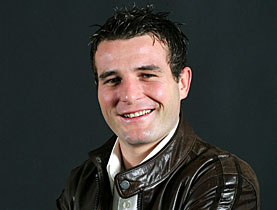
Alex Frei

A celebrity in Switzerland, national team captain and striker Alex Frei has also made a name for himself abroad.
After leaving Switzerland, he first played in the French top division, and now demonstrates his skills in the German Bundesliga for Borussia Dortmund.
To find Dortmund’s training ground takes some legwork, through the mud. Diggers and trucks have taken over the area, a former airfield and British army training camp.
Today, residential buildings are under construction. A local points behind a huge pile of earth to the where the ground is, pointing the lost journalist in the right direction.
For the past year, Dortmund has had an ultramodern training facility in this neighbourhood. The grass is golf course is perfect despite constant use.
To watch a training session, you have to sit behind a fence and listen to the two German trainers bellow at their rich and famous players. During the occasional break, you can hear the many languages spoken by the team: Portuguese, Spanish, Croatian and German.
Swiss-German dialect also rings out, with two Swiss players on the team – Alex Frei and Philipp Degen – as well as Croat Mladen Petric, who used to wear the Basel strip – all having their say.
The locals don’t seem to care that their favourite team is not particularly German. All that matters is that they win.
Avoiding labels
Frei has earned their affection, scoring enough goals to make him one of the most liked members of the squad.
When swissinfo visited, only a few dozen fans had bothered to turn up on a cold winter’s day. Among them was Köbi Kuhn, manager of the Swiss national team. But he kept a low profile: all he was prepared to say is that he was meeting Dortmund’s coach.
Frei, whom we met after the training session, only confirms that the meeting was probably about him and Degen.
The striker was clear about what he will and won’t talk about: he steers away from questions about his private life and avoids politics. “Otherwise you end up with a label,” he says.
“That doesn’t mean I don’t have an opinion about politics. I say what I think when I’m not in public,” he added.
Frei is happy to talk about his membership of the players’ union in Germany and Switzerland, because he feels it’s important to defend their interests.
“Not just for me,” he points out, “but because there are a lot of footballers who don’t earn enough or who are suddenly unemployed because they can’t get a contract.”
The union has fought, among other things, so that unemployed players can keep on training with clubs to boost their chances of getting a contract elsewhere. It also offers reconversion measures to help those who no longer have a professional career to look forward to.
For Frei, this is unlikely to happen tomorrow, even if he admits there are no guarantees in his line of business. Rising through the ranks is one thing, but staying at the top is a different ball game.
Off field duties
His parents made sure he got a diploma even though it was more than likely he would become a professional footballer.
A fully qualified office employee, Frei reckons he would have ended up working in a legal office if he hadn’t become a pro-footballer.
Despite his qualifications, he admits though that he doesn’t look after his own interests. “I did learn how to fill out a simple tax form, but it would be much too complicated now,” he says. “I need real experts.”
Frei has also delegated answering fan mail and negotiation with sponsors to his father Paul. “But I sign every card sent to supporters,” he hastens to add.
It’s his uncle Martin, a former player himself in Switzerland’s top division, who looks after club transfers.
Football is truly a family affair with the Freis. The striker’s little sister, Andrea, is also a player, and has a few things in common with her brother.
“Goalkeepers are afraid of her and she is tactically much smarter than me,” reckons Frei. A warning perhaps for anyone who would take the rest of the family too lightly.
swissinfo, Peter Siegenthaler
Alex Frei began his career at FC Basel, but because of a lack of playing time, switched to FC Thun in the second division in 1998.
A year later, he moved to FC Lucerne, before a transfer to Geneva’s Servette club. It was there, between 2000 and 2003, that his scoring prowess attracted international scrutiny.
In 2003, he signed with Rennes in the French top division. The next season, he was the league’s top scorer with 20 goals.
In 2006, he was transferred to Borussia Dortmund after the World Cup for €5 million (SFr8 million), scoring 16 goals in his first season with the club.
Frei was made national team captain in March 2007, but was sidelined two months later by a hip injury that kept him out of action until the beginning of this year.

In compliance with the JTI standards
More: SWI swissinfo.ch certified by the Journalism Trust Initiative





























You can find an overview of ongoing debates with our journalists here . Please join us!
If you want to start a conversation about a topic raised in this article or want to report factual errors, email us at english@swissinfo.ch.